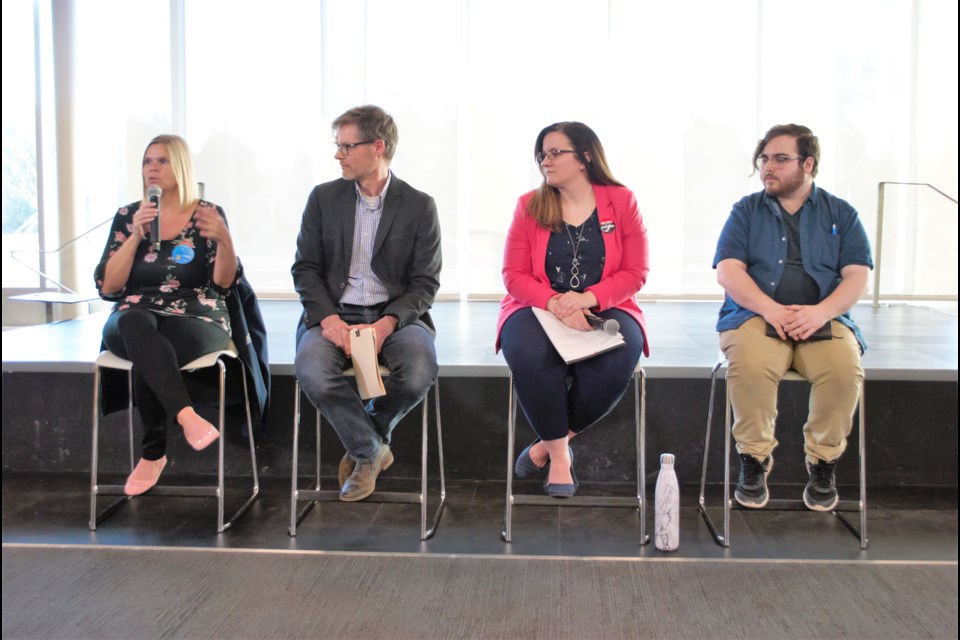While at work, how many times would you accept being hit?
For some teachers across Simcoe County, they endure violence every day. Health and safety was one of many topics covered during a panel discussion that took place at Innisfil ideaLab and Library on Monday night.
The discussion included speakers such as Jen Hare, a family studies teacher at Simcoe County District School Board (speaking on secondary), Brandon Rhéal Amyot, of the Lakehead University Student Union in Orillia (post-secondary), Kelly Martin, Ontario Public Service Employees Union Local 330 president (support staff) and Pekka Reinio, teacher (elementary).
“In March of 2015, I was injured at work. I would like to tell you that the 45 blows to the top of my head that resulted in a skull fracture and ruptured eardrums was an anomaly, and had never happened before,” said Hare. “The reality is, there are people in your buildings today that have been hit up to 300 times in a four-hour shift.”
“What we need to decide, and I’d like to have each and every one of you to think about is, if I was sitting at work, how many times would I accept being hit?” she asked. “How many times would I sit there and have someone literally punch and kick me, spit on me, and how long would I put up with that?”
Hare said that while education workers across Ontario have been begging for more help when it comes to these and other issues school boards face, the recently released Ontario budget paints a picture of a grim future where not only will schools not be getting more support, they will be losing some of the support they previously had.
“We’re trying to speak up and say that we need support. We don’t want those students to leave our schools,” she said. “They’re not violent because they want to be. They’re violent because they need something and they have a hard time communicating to us what that thing is.”
Martin had her own experience of being assaulted while at work.
“In 2009, I was assaulted by a student,” said Martin. “I was off work for four months. Nobody helped me take care of my three and five year old. Nobody helped me take care of my house.”
“The poor child that needed the support, didn’t have enough of it to make his day successful. That’s what’s going on in our schools,” she said.
“That is not going to get any better by Ford’s decisions with education cuts,” Martin added.
Other topics discussed during the panel discussion were inclusivity and accessibility, post-secondary funding, and concerns about e-learning.
A statement released by the Ministry of Education recently said e-learning will be phased in starting in the 2020-21 school year. The statement promised expanded broadband access at all Ontario schools, but not until 2021-22.
“My current (internet) bill is $60 a month. I got a quote from Rogers for my current usage, and it was $380. With my two children, I’m looking at $15,000 to $20,000 a year for high-speed internet for my home (for my kids to do) these mandated courses,” she said.
“I’m looking at a class-action lawsuit... but until it actually happens, I can’t get reparation for it. I can’t do something pro-actively.”
The audience member said she wants the school boards to work with her to file a Charter challenge of discrimination based on income and location.
“I need your help, because I can’t do this alone,” she said.
Reinio brought up his own concerns about the new e-learning component.
“I think there’s another issue we’re not hearing about with e-learning,” he said. “I don’t know if anyone’s taken an online class lately. I have. It requires a certain amount of dedication and organization and skills that perhaps a Grade 9 or 10 student don’t yet have.”
“I think it’s asking a lot for a lot of these kids to take one course each year online and expect them to succeed,” he said.
Looking forward, the panellists agreed that education should also be overseen by a federal body, to mitigate damage that could be done by the Ontario government of the day.
“We’re the only G7 nation that has no federal oversight over education, which is very odd,” said Amyot. “We don’t have a federal education minister. What I would really like to see is some leadership from the federal government for, similarly modelled to the Canada Health Act, a federal education act that looks at grade school education and post-secondary education.”
“That would be a way to ensure that, when the ebbs and flows of politics happens in the provincial government, there will always be some sort of federal aspect to make sure that not all is lost,” Amyot added.
